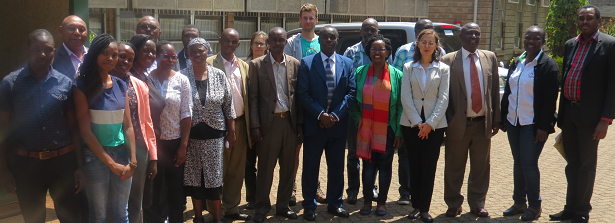Effectiveness of networks in seed potato sector development

Sustainable upscaling of agribusiness in emerging economies is an enormous challenge. Radboud University conducted a pilot project with the main objective to understand the drivers of sustainable upscaling (environmental, economic and social) by modelling the impact of firm network characteristics and institutional conditions in value chain clusters. The project was implemented in 2017 in the seed potato sector in Kenya and Ethiopia. The Food & Business Knowledge Platform (F&BKP) supported this pilot to explore the potential of the methodology which includes a quantitative analysis of multiple network relations and the significance for sustainable upscaling performance.
Please download a summary of the full report “The Effectiveness of Networks in Seed Potato Sector Development in sub-Saharan Africa”. The summary includes a link to the full report.
Enhancing sustainable upscaling requires understanding of firm networks including e.g. the diversity of partners, strength of ties, governance and mechanisms for knowledge exchange. Also institutional conditions such as value chain structure for sourcing, farming systems and regulation and legislation are essential. Of course sector features for example inter-firm cooperation, local pool of skills, the role of business associations, and non-profit seeking enterprises determine the potential for upscaling.
Potato is an important cash crop, contributes to food security and is widely grown by small-scale farmers in the highlands of East Africa. The production has more than doubled in the last 20 years. The lack of high quality starting material is the single most important constraint for productivity and profitability in the potato value chain. Radboud University applied its “clustering approach”, i.e. the identification and measurement of institutional quality and of network connections between public and private actors in the seed potato sector in Kenya and Ethiopia. The approach also includes an analysis of the combined influence of both institutional quality and networks on sustainable upscaling.
The quantitative analysis showed among others that seed producers are able to achieve high yields and profits when either labour and capital market quality or the quality of labour and policy environment is ensured. The pilot also showed significant insights in the nature of the network connections that support sustainable upscaling. For instance there was a better balanced approach to partnering with public and private actors in Kenya than in Ethiopia, which may lead to more economic and social impact.
The pilot did not offer new building blocks in ways of doing business in low and middle income countries but confirms the knowledge and experience of experts in the sector after engaging with all relevant public and private stakeholders. The institutional infrastructure (e.g. research, storage, regulatory systems, certification) and the political-economic environment (e.g. phytosanitary policy, variety protection) are the major determinants for sustainable upscaling. Many of the other aspects are less crucial according to stakeholders from the Dutch seed potato sector.
Whether this “clustering approach” has added value for analyzing agriculture sectors in emerging economies and developing countries is not yet demonstrated. The researchers advise to have more interviews with farmers, spend more time in the field and sample a range of highly diverse countries in the same sector for a comparative analysis and to explicate the types of networks needed for upscaling.





